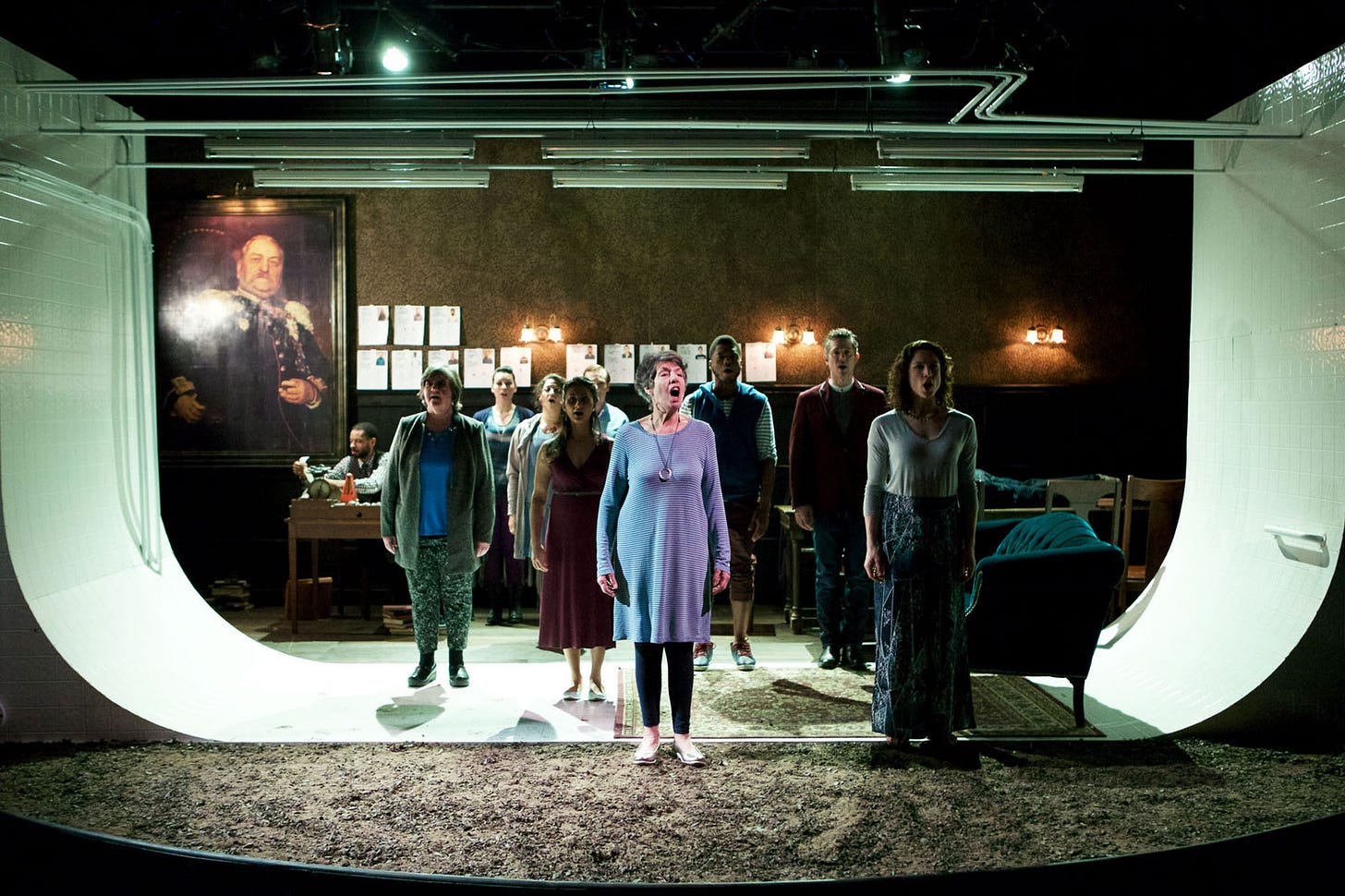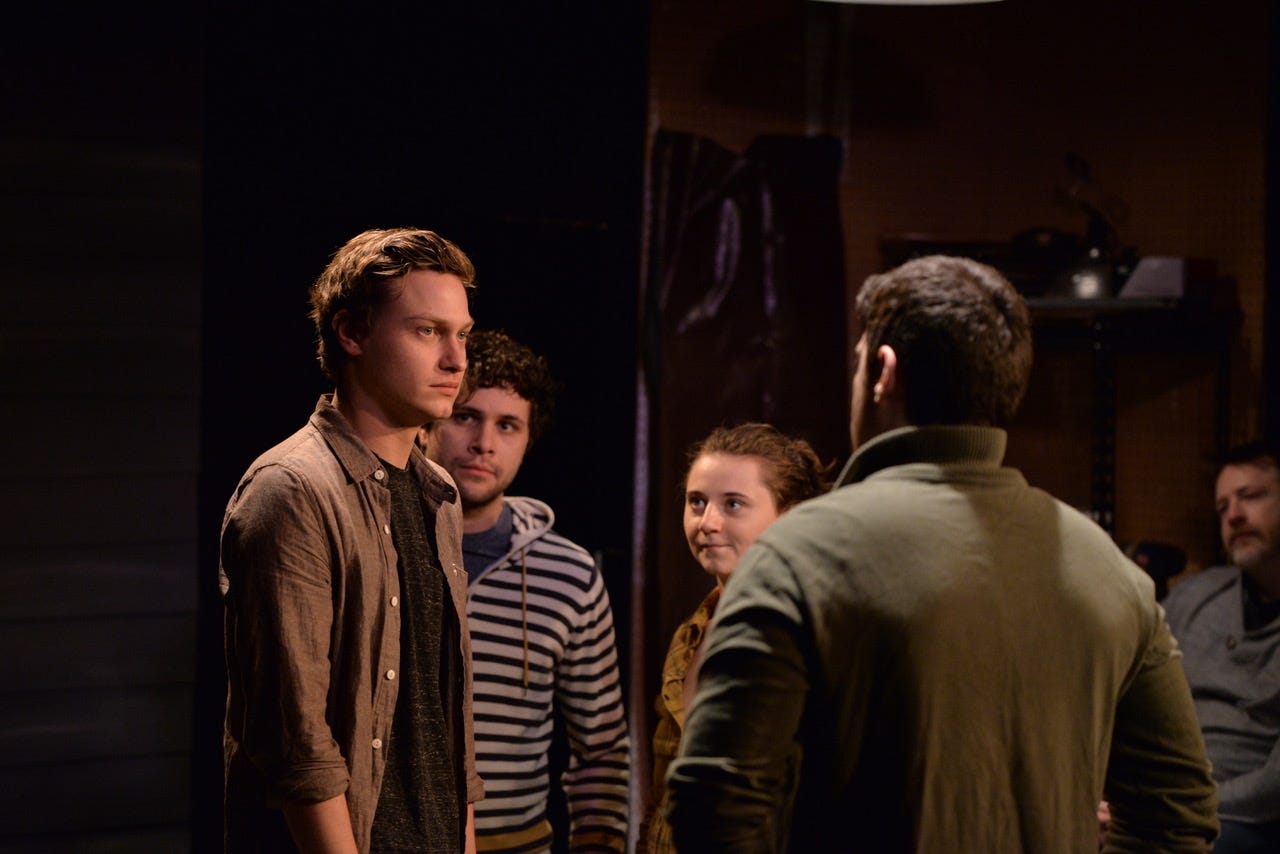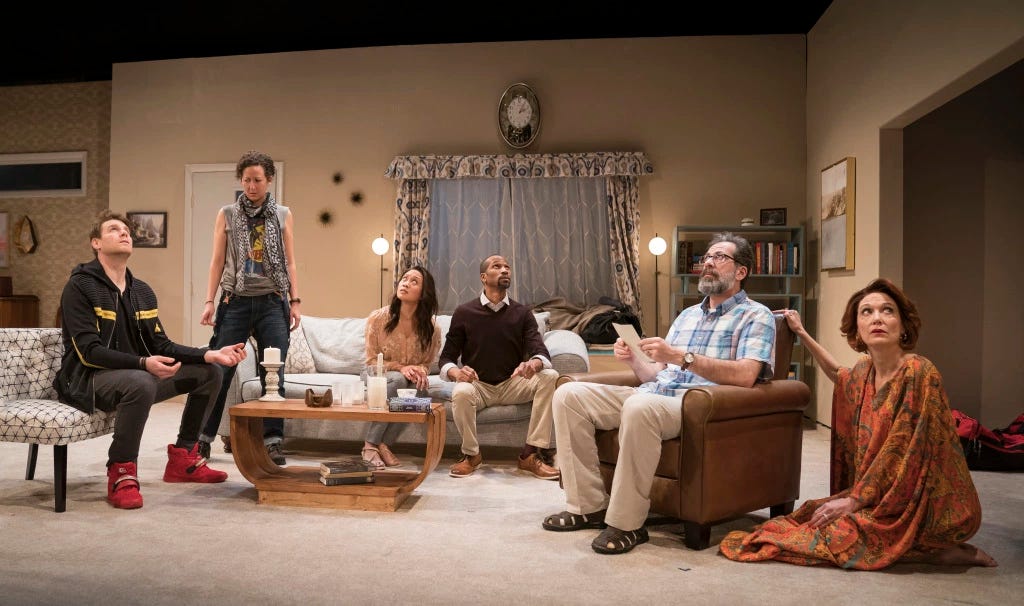Welcome to the free weekly edition of Storefront Rebellion! This free digest brings Chicago theater news and reviews from me, Kris Vire, right to your inbox. If you’re enjoying it, please tell your friends. Word of mouth is our best advertising. (I borrowed that from a few thousand post-curtain-call speeches.)
I also very much want to hear your feedback: Reply to this email, or if you’re reading this on the web, hit me at kris@krisvire.com or find me on Twitter @krisvire.
SUBSCRIPTION SALE! If you haven’t yet made the leap to becoming a paid Storefront Rebellion subscriber, you’re missing a lot (as you’ll see below). Now’s a great time to upgrade: From now until March 31, you can use this link for a 20 percent discount on an annual subscription. Feel free to share it far and wide.
And speaking of upgrades…
Steep goes Equity

Steep Theatre Company ensemble members Michael Salinas, Jim Poole and Caroline Neff in 2013’s The Knowledge. Photograph: Lev Kalmens
The Chicago Tribune reported on Tuesday that Steep Theatre Company will put its $150,000 “Stepping Stone” grant from the Bayless Family Foundation, announced earlier this month, toward going Equity. As Chris Jones put it:
Chicago continues to have a thriving non-Equity theater scene. But the transition to an agreement with the union of actors and stage-managers has long been regarded as both a move to another level of professionalism and the best way to sustain a company (and the city’s actors) in the long-term.
Steep, now in its 18th season, has long been one of the city’s top storefront theaters. That was true even in its first seven seasons, in a shoebox of a storefront near the Sheridan Red Line station, where live music from the bar next door threatened to drown out the actors most nights.
Steep’s been in its current home, several El stops further north on Berwyn, for more than 10 years now, and recently expanded its footprint there with a new bar and cabaret space. Like many small theaters founded in the Steppenwolf ensemble model, it’s had to contend with its family of actors joining the union as they find success on other stages and no longer being able to work at their home company; as managing director Kate Piatt-Eckert notes in the Tribune piece, Steep ensemble members like Caroline Neff and Michael Salinas haven’t been seen on Steep’s stage in years now that both are Equity members. It’s high time the company made the leap.
And yet seeing that Steep’s leap merited an 800-word article in the paper got me thinking about just how rare that transition has been in recent years.
Some storefront theaters have been proudly Equity since their establishment, like Rivendell, Firebrand and the Gift. Some young non-Equity companies that aren’t ready to go union themselves have smartly partnered with union theaters to be able to offer Equity contracts for certain productions—see Haven Theatre’s current team-up with About Face for The Total Bent.
But how many theaters in recent years have leveled up to Equity after notching an established history—critical praise, a subscriber base, a permanent venue—as a non-Equity company, as Steep is doing? I believe you can count them on one hand: Halcyon Theatre, the Hypocrites, and the House Theatre of Chicago.
I spent a good amount of time last night combing through the Jeff Awards archives for theaters that had shifted from eligibility in the non-Equity wing to the Equity wing since 2008. The three H’s were all I could confirm.
Then I decided to look at the winners of the Broadway in Chicago Emerging Theater Award, which has been administered annually by the League of Chicago Theatres since 2007. Three of the 12 recipients—Silk Road Rising, 16th Street Theater and Route 66 Theatre—were already Equity houses when they were chosen. The House and, now, Steep have moved up. Three recipients—the side project, Theatre Seven of Chicago and Oracle Productions—have outright closed or gone radio silent.
(Things aren’t looking so great for the Hypocrites either, I’m sad to report; it’s been nearly a year since The Aristophanesathon, the company’s first production under its new prepaid model, and at some point since then the Hypocrites’ board of directors quietly posted a notice that Sean Graney was stepping down from the company again.)
The other four companies to receive the Emerging Theater Award—The New Colony, Jackalope Theatre, Sideshow Theatre Company and Broken Nose Theatre—remain non-Equity. And there are models they could follow to remain that way forever: companies like Strawdog, Griffin, the Factory and Lifeline have been operating as non-union affairs for decades, with no apparent intention to change.

Sideshow Theatre Company’s Antigonick, 2015. Photograph: Jonathan L. Green
The question, then: Is that okay?
Chicago has long distinguished itself from New York and Los Angeles, at least, in that we don’t view Equity versus non-Equity as equivalent to professional versus nonprofessional. In NYC there are constant debates about whether the Flea or UCB are exploiting their performers’ labor by paying them only in “exposure”; in L.A. there’s a persistent faction of actors who believe they should be able to be members of the union and do theater for no pay.
Here, the theater press, the major award-giving body—and the audiences following their lead—have a history of putting union and non-union theater on equal footing, for better or for worse. Heck, it’s a big part of what drew me to move to Chicago after college in pursuit of a theater career, like so many others; non-Equity theater was taken seriously here, so you could get cast and get reviewed and start building a résumé—or your own theater company—without having to jump through the union hoops first.
But for a city that’s pro-union in so many other fields, it’s a little odd that we wound up this way. I’ve had union-proud Equity actors tell me they wish Chicago’s theater critics would give less equal weight to non-union shows—the idea being that we might provide an incentive to pay actors like the professionals they are.
But the scrappy storefront/church-basement Steppenwolf thing is so baked into Chicago theater’s origin myth, and actors who have yet to go union are sometimes counseled by their friends to wait as long as they can: If you join, you won’t be able to work with your favorite companies anymore, and there aren’t enough contracts to go around, and you’ll be competing with actors from New York and London for those contracts there are. And yet it can also feel unseemly to see theaters that don’t pay their actors a living wage mounting capital campaigns to renovate buildings!
I’d love to hear what you think about this. Feel free to email me, and let me know if you’d be okay with your comments being published somewhere down the line.
Reviews and other views
Since last week’s digest, I’ve published three reviews for Storefront Rebellion paid subscribers (get that discount!) and another at the Sun-Times.

From left: Vic Kuligoski, Jose Cervantes, Julia Rowley and Bob Pantalone in May the Road Rise Up at the Factory Theater. Photograph: Michael Courier
In a Rogers Park twofer, I covered The Man Who Was Thursday at Lifeline Theatre and May the Road Rise Up at the Factory Theater.

Scott Shimizu and Collin Quinn Rice in Mike Pence Sex Dream. Photograph: WHO IS SHE
Also in the newsletter, I reviewed the delightfully subversive Mike Pence Sex Dream at First Floor Theater.

The cast of Act(s) of God at Lookingglass Theatre Company. Photograph: Liz Lauren
And at the Sun-Times, you can read my thoughts on Kareem Bandealy’s wildly ambitious Act(s) of God at Lookingglass.
Bonus reading
Finally this morning, I want to direct your attention to the March issue of American Theatre magazine, which looks at “the state of Black theatre,” and in particular to two wonderful pieces by Chicago critic Jerald Raymond Pierce. “We’re Going to Need a Bigger Table” is a fine snapshot of the rising generation of Black playwrights, including Dominique Morisseau, Ike Holter and Branden Jacobs-Jenkins, while “Chuck Smith, Charles Smith and a South Side Friendship” is a lovely Q&A with the director and writer not to be confused with one another (though they often are).
Thanks for reading! This is the free weekly edition of Storefront Rebellion, a newsletter about Chicago theater by Kris Vire. You can subscribe for $6 a month or—now through March 31 only!—just $48 a year to receive exclusive show reviews and features in your inbox.
Send tips and feedback to kris@krisvire.com, and if you know someone you think would enjoy this newsletter, feel free to forward this to a friend.



